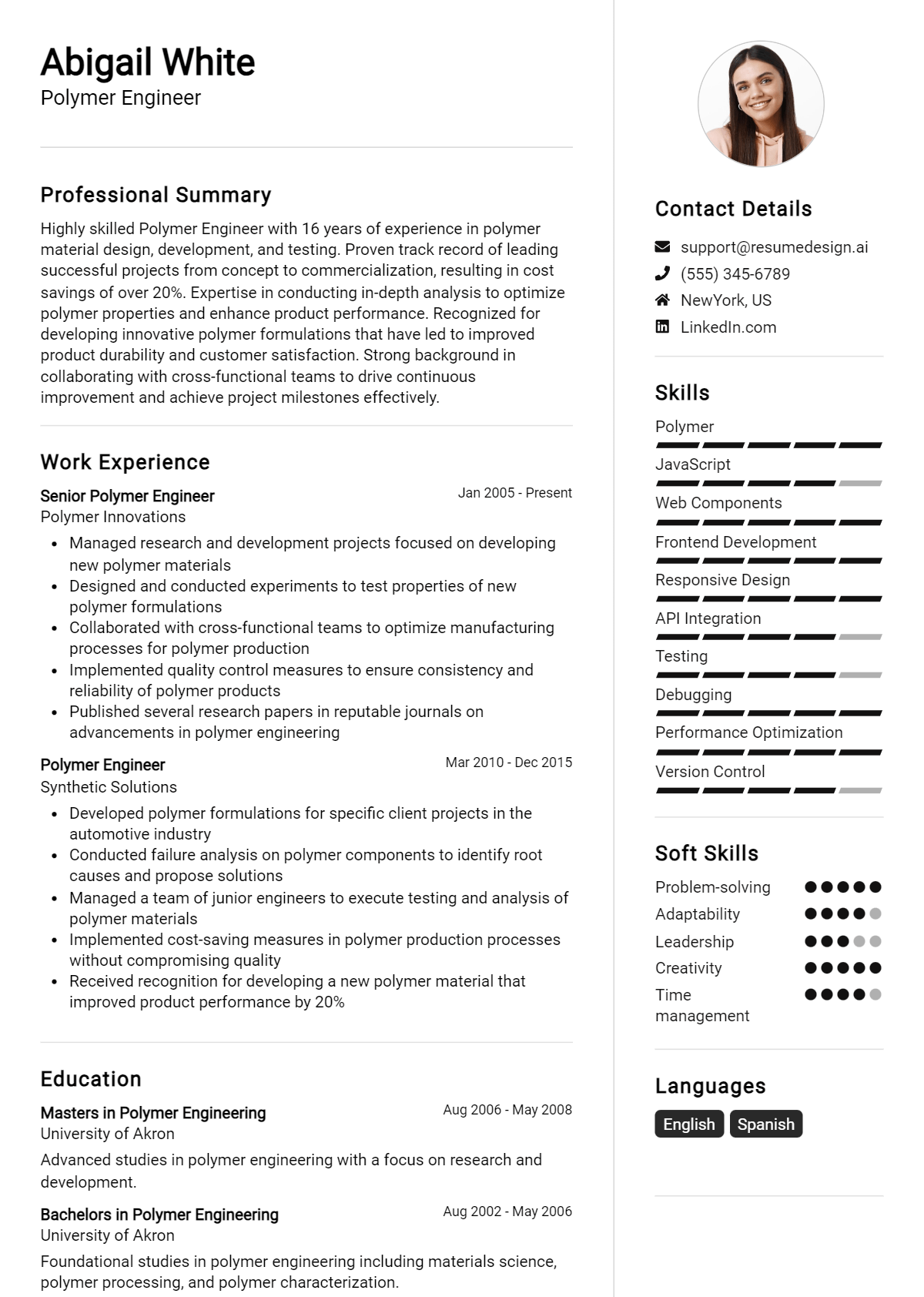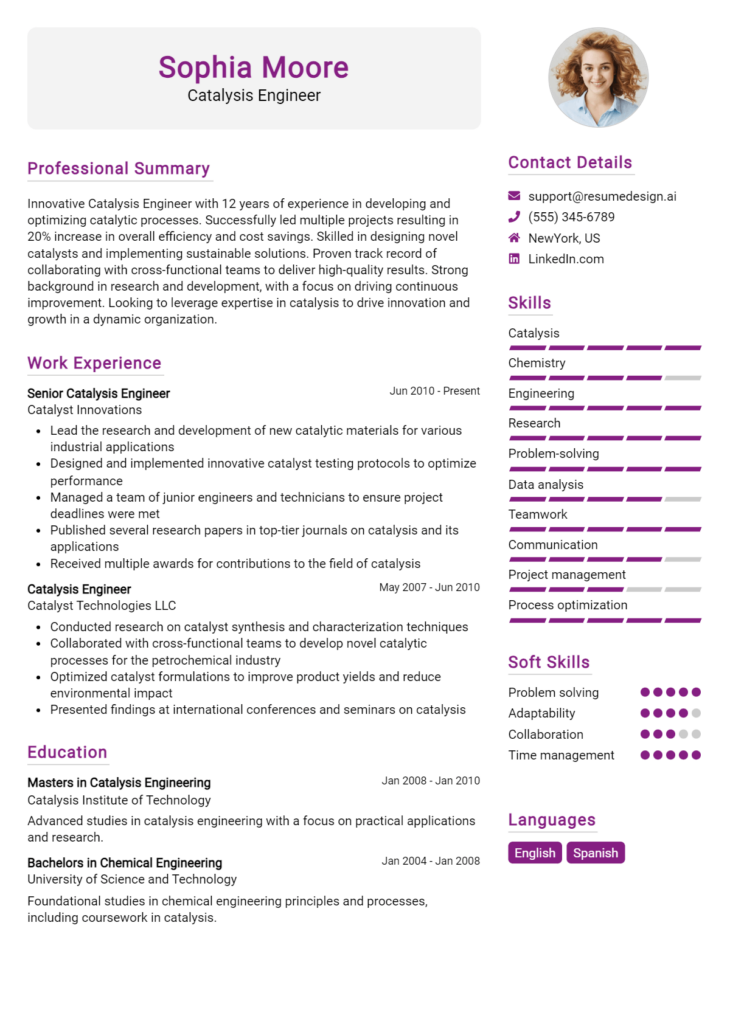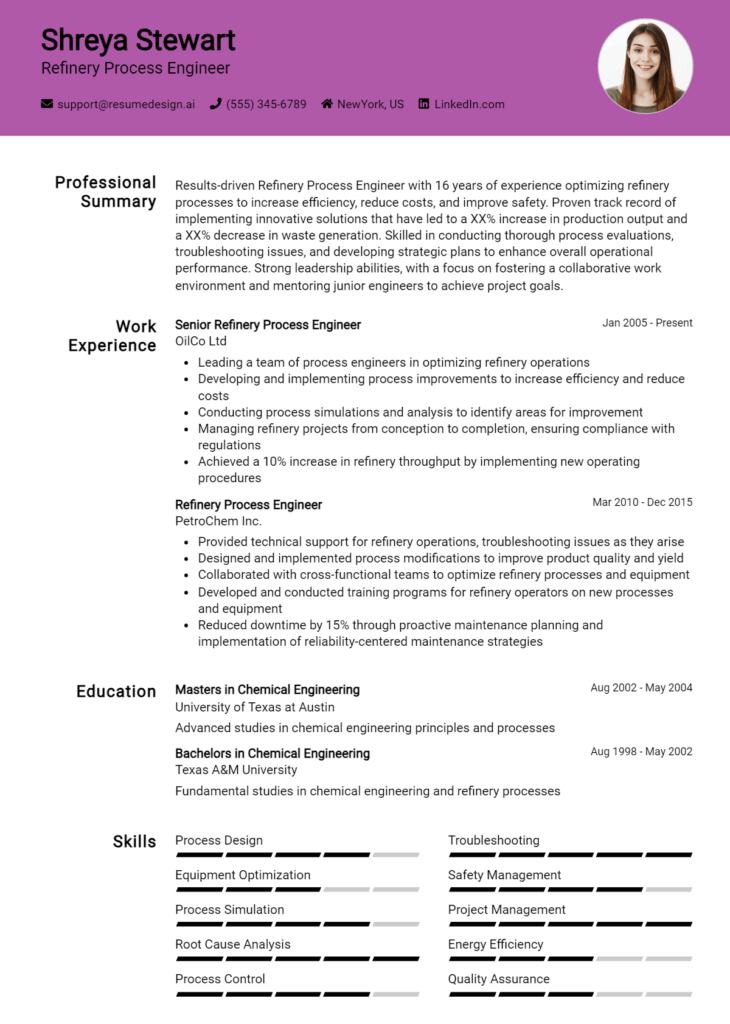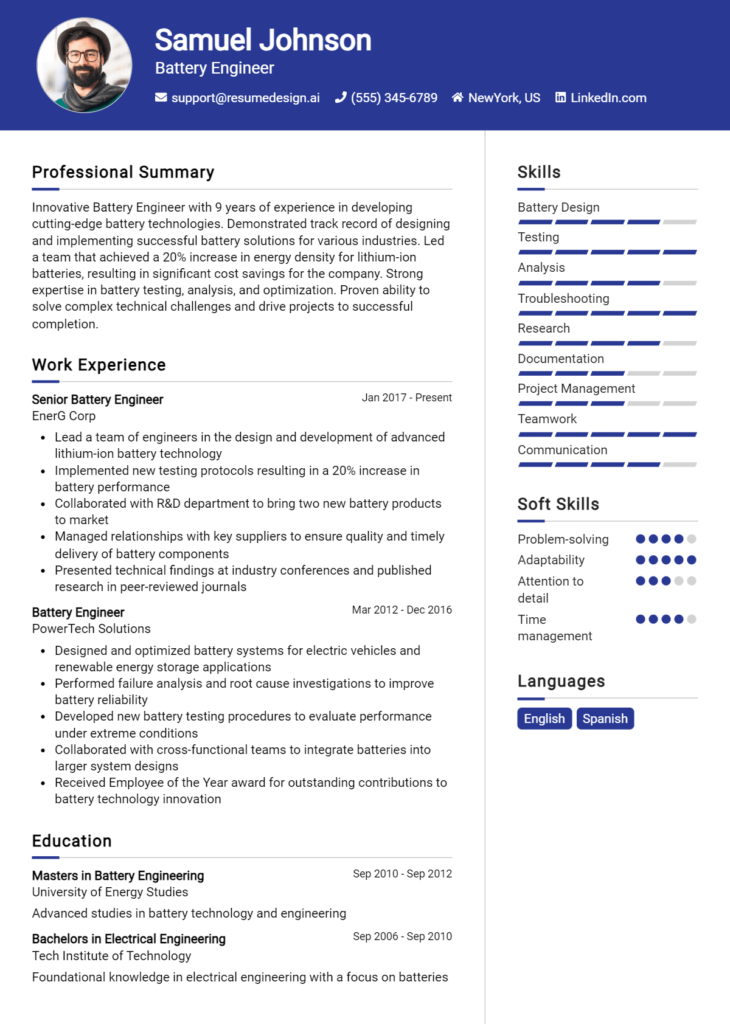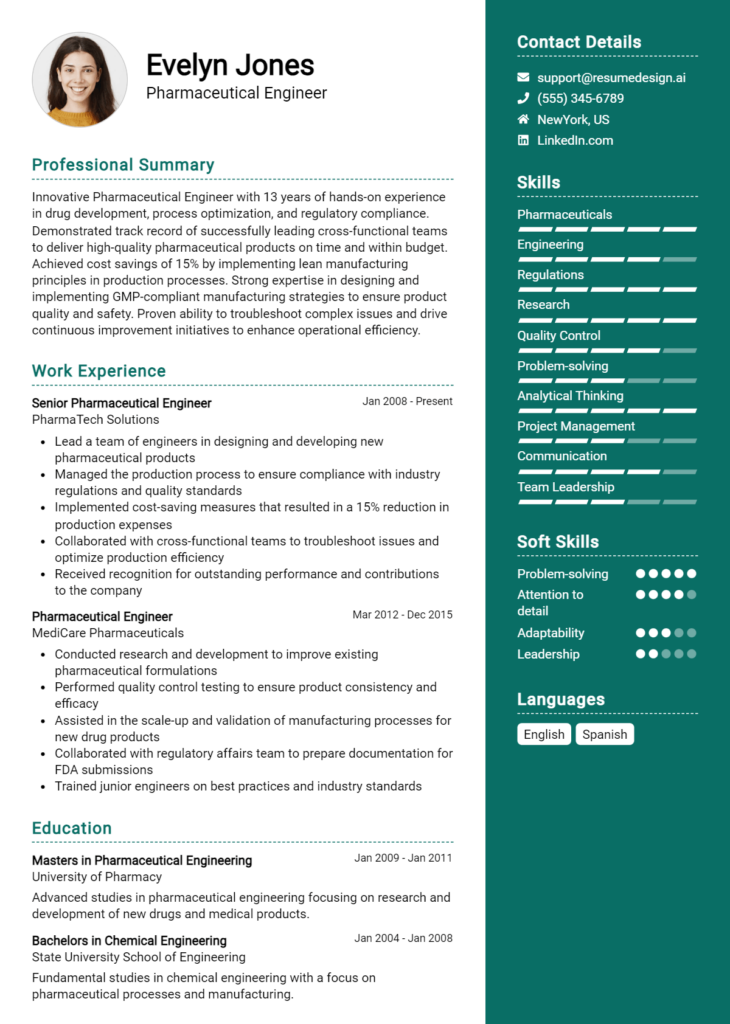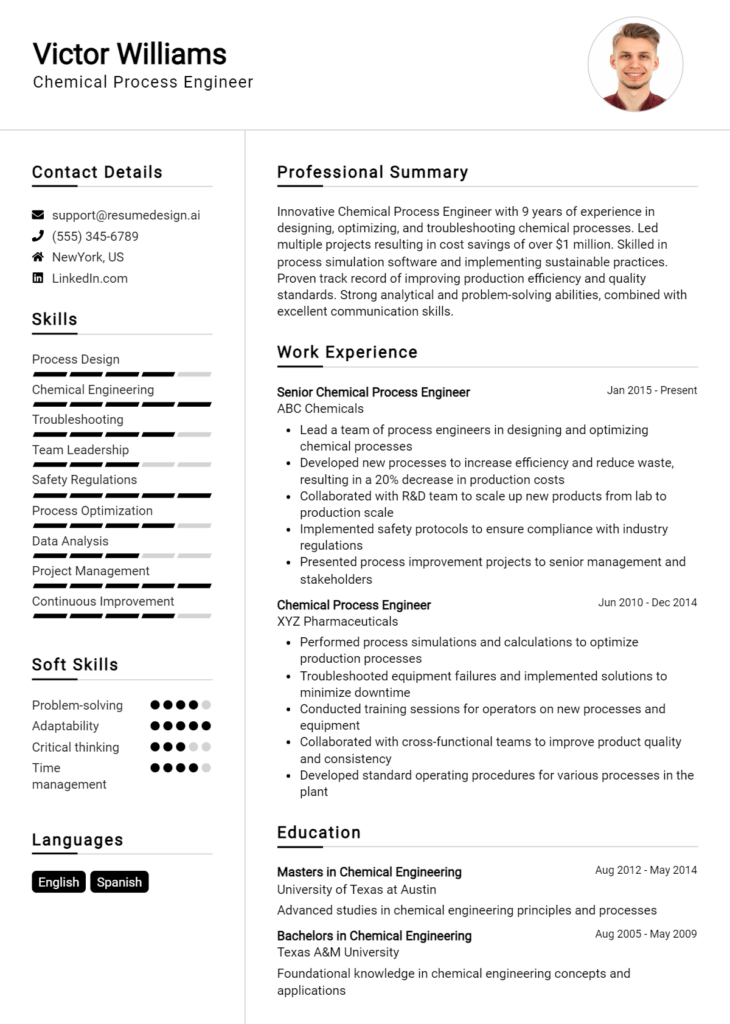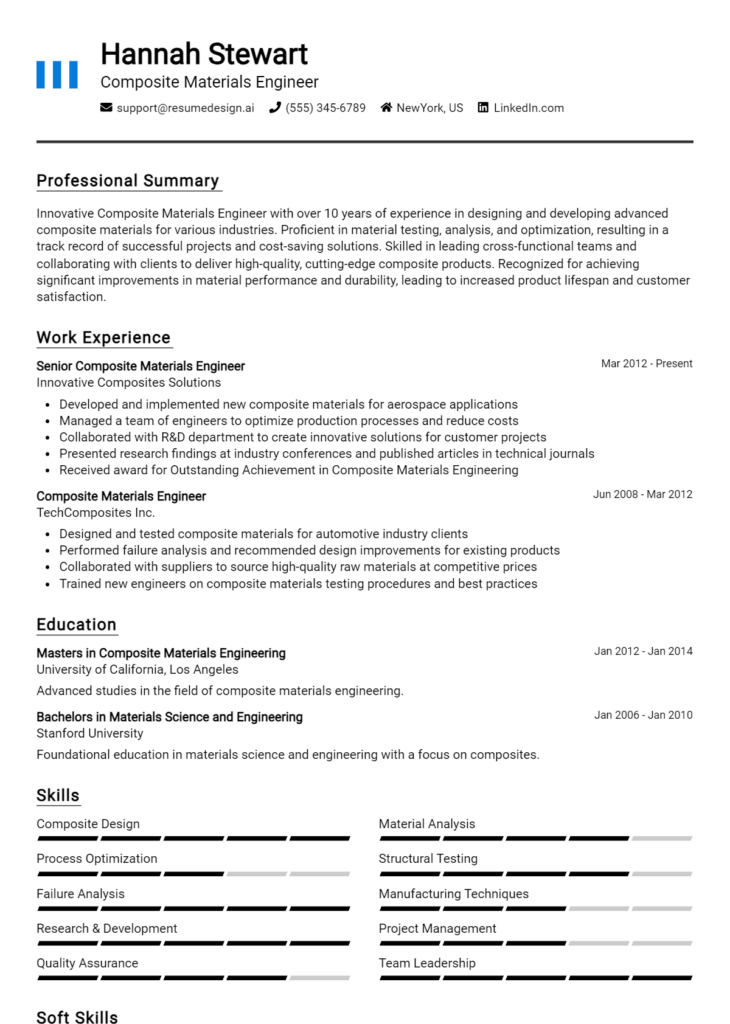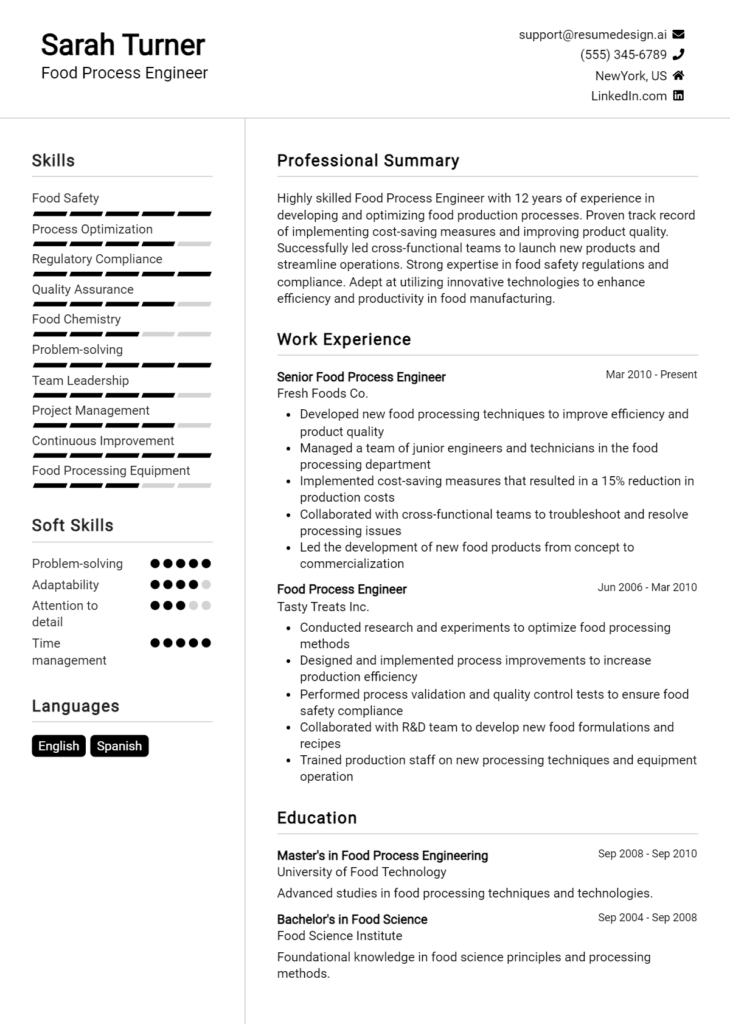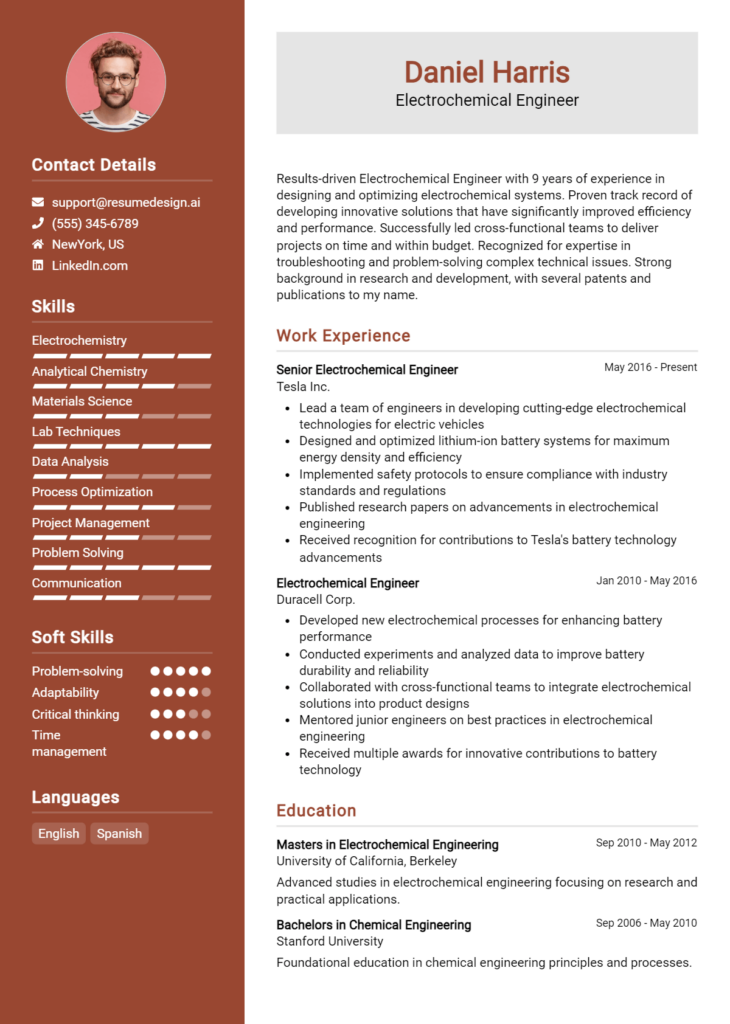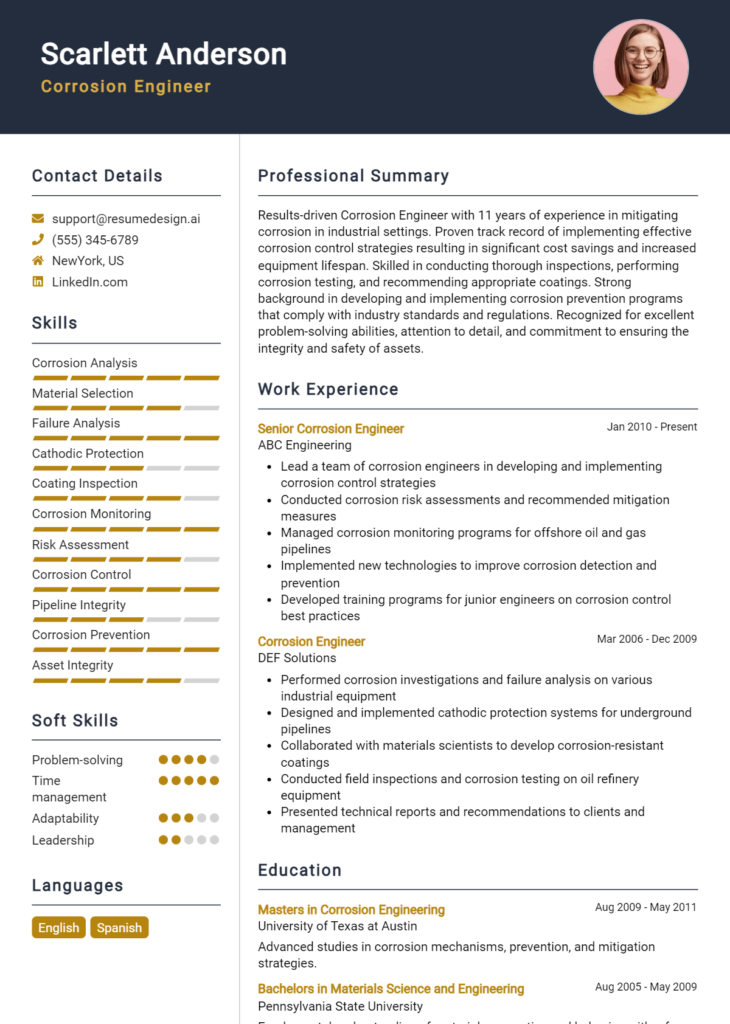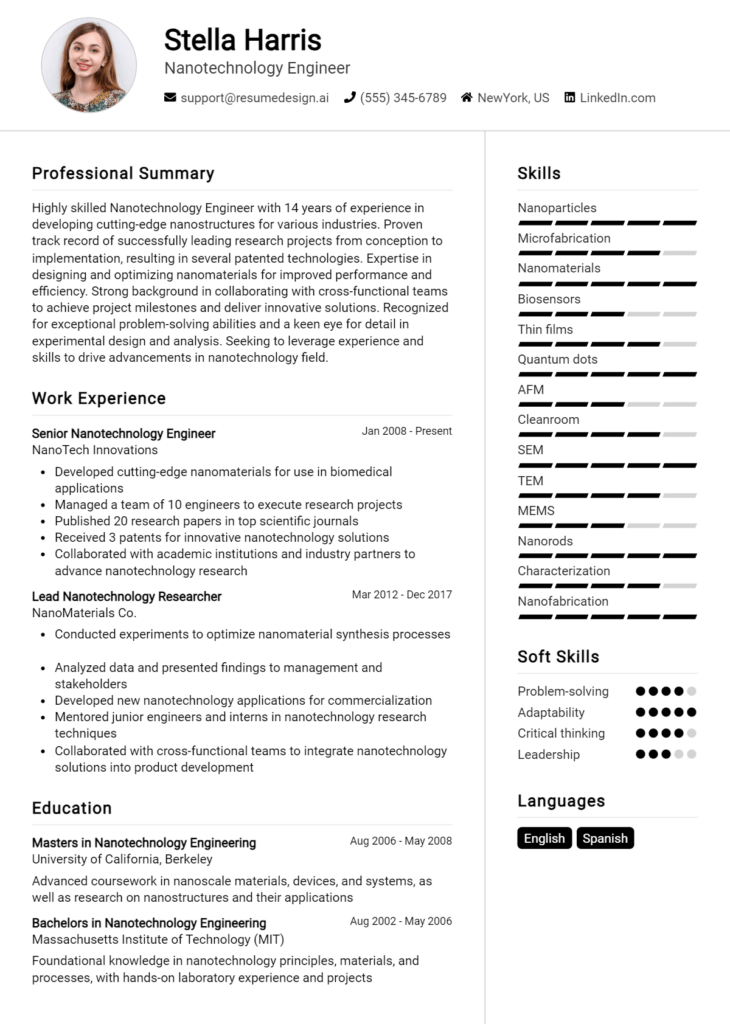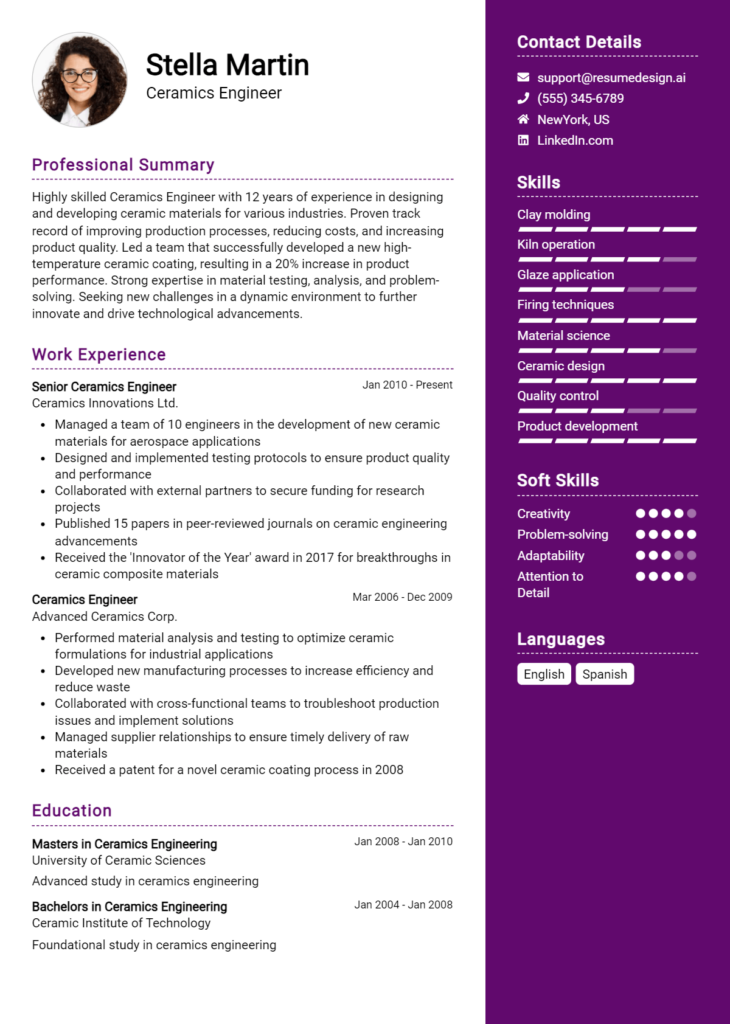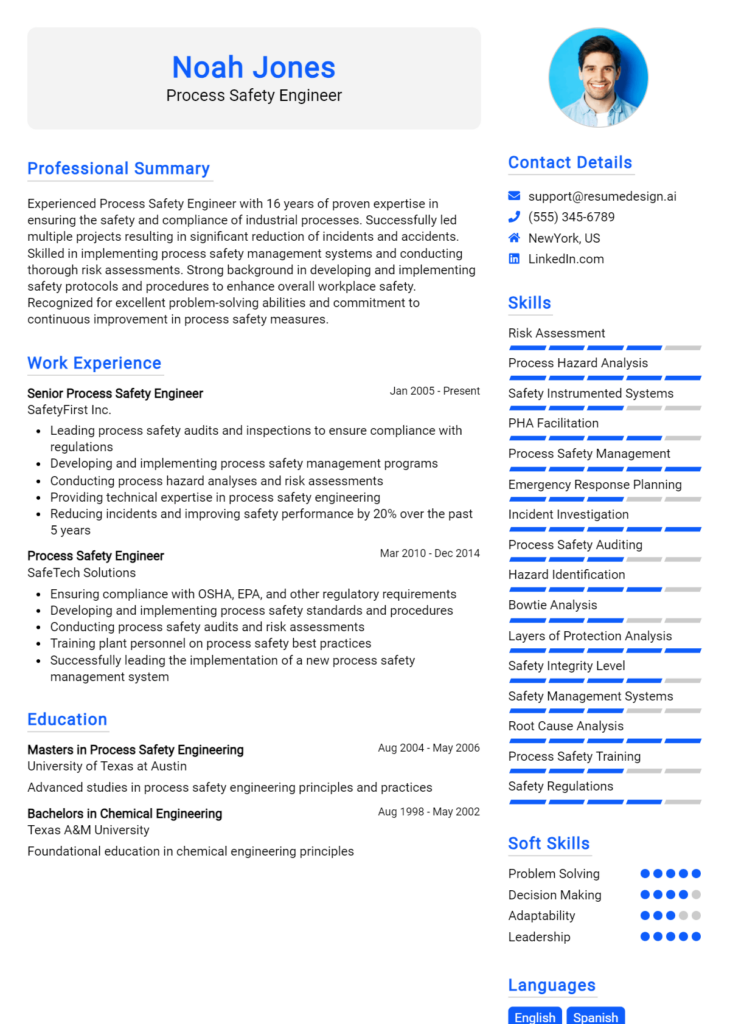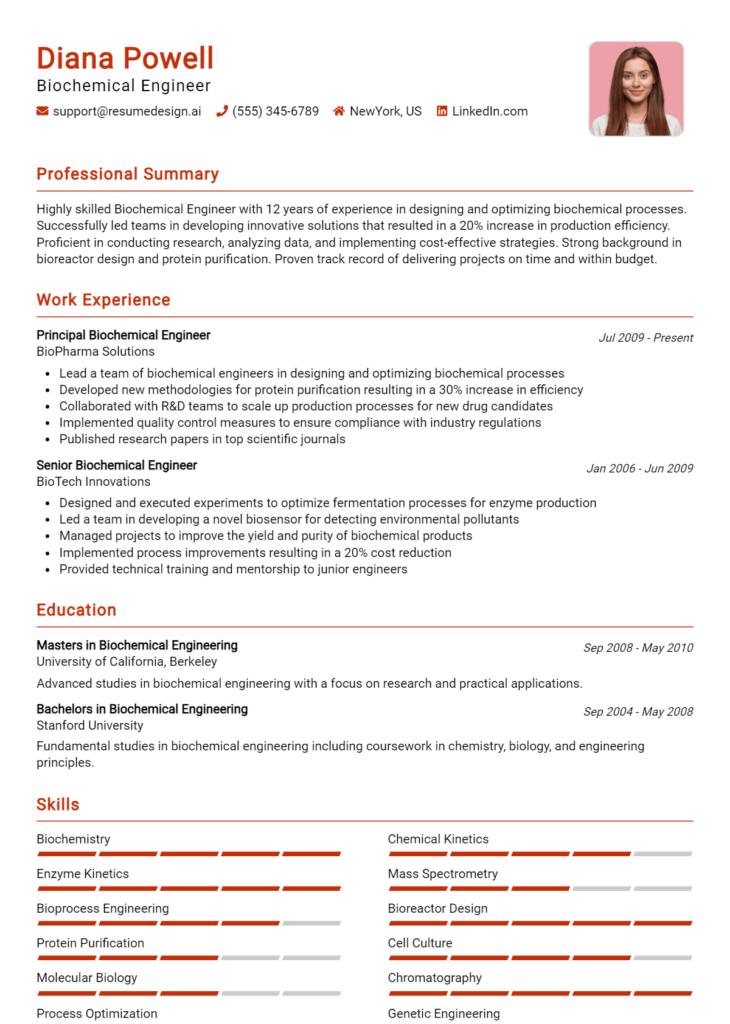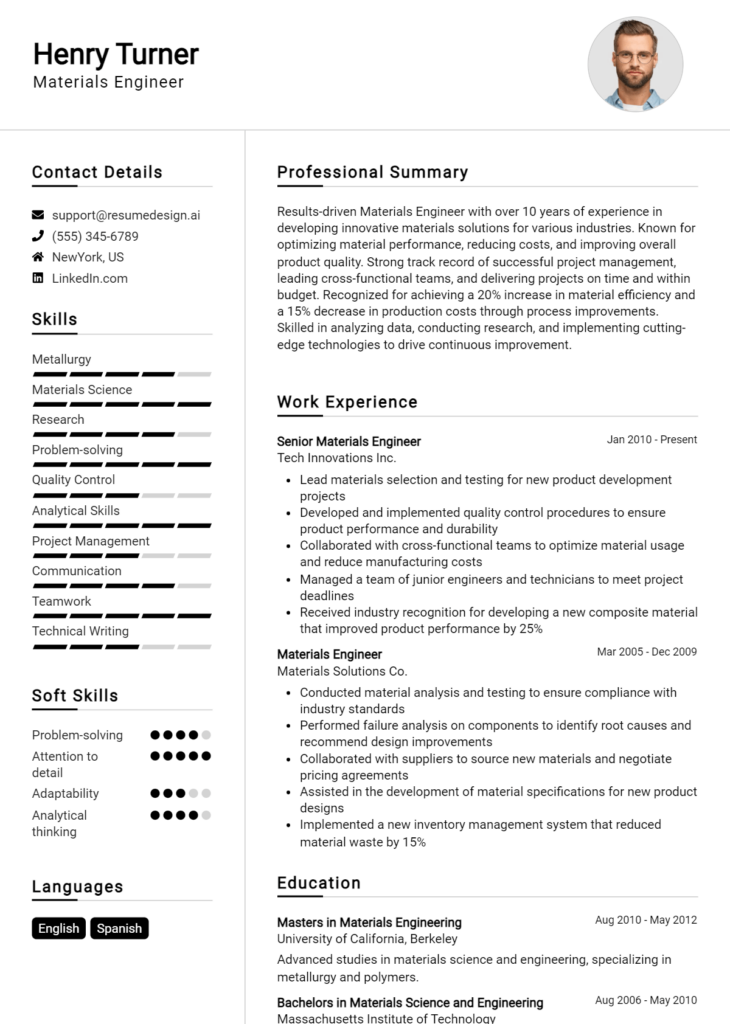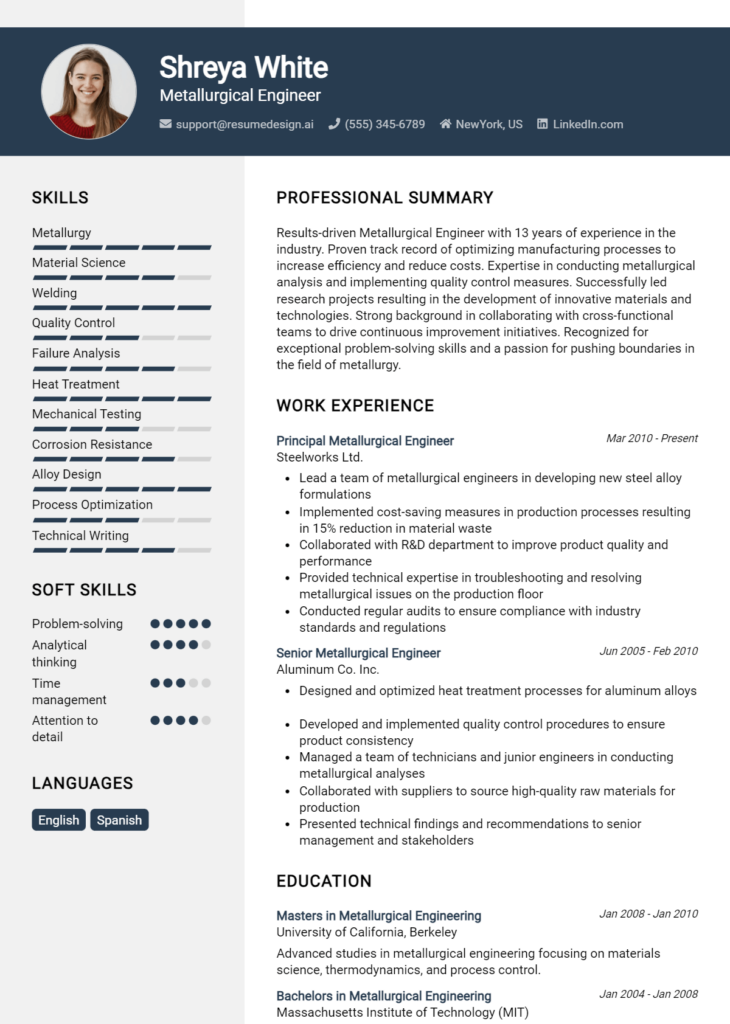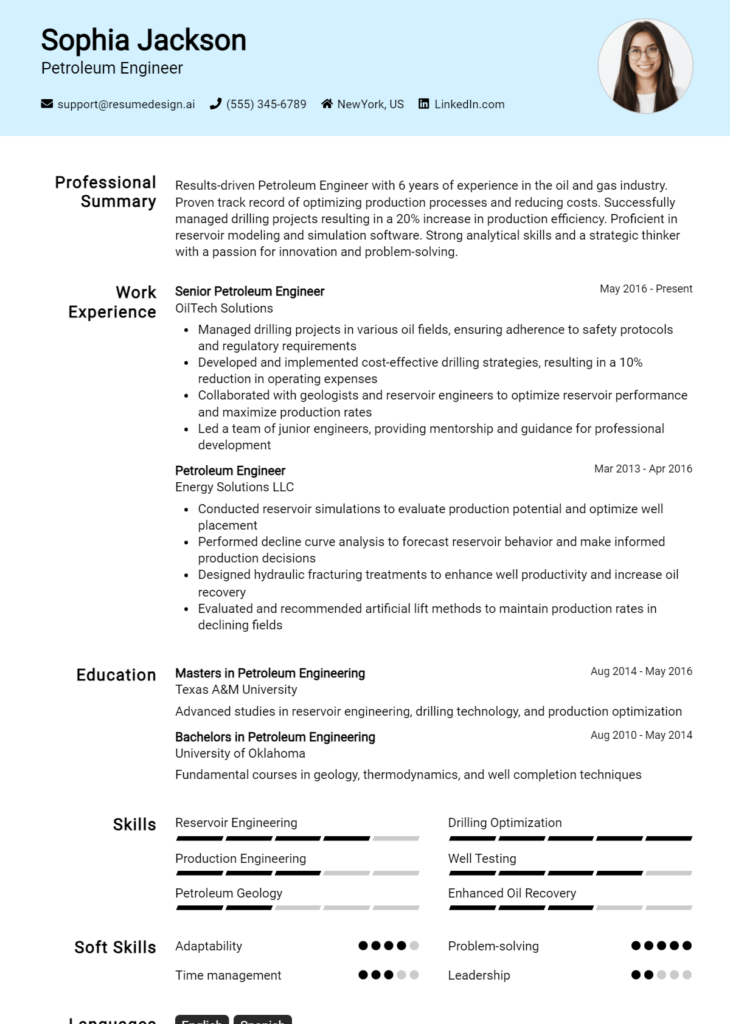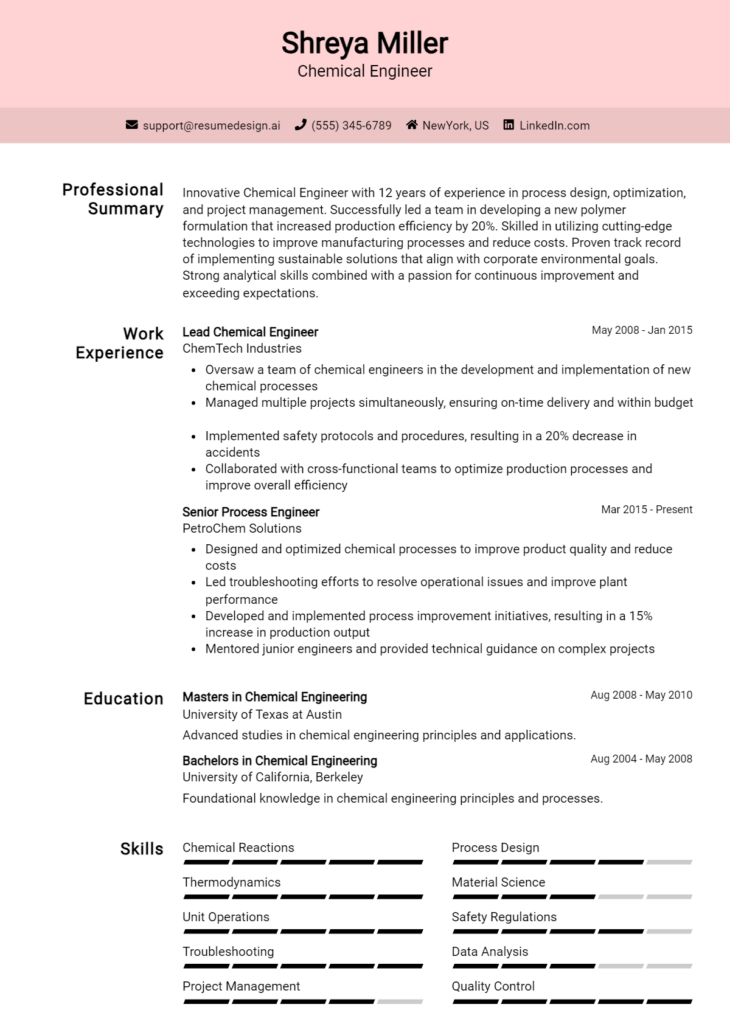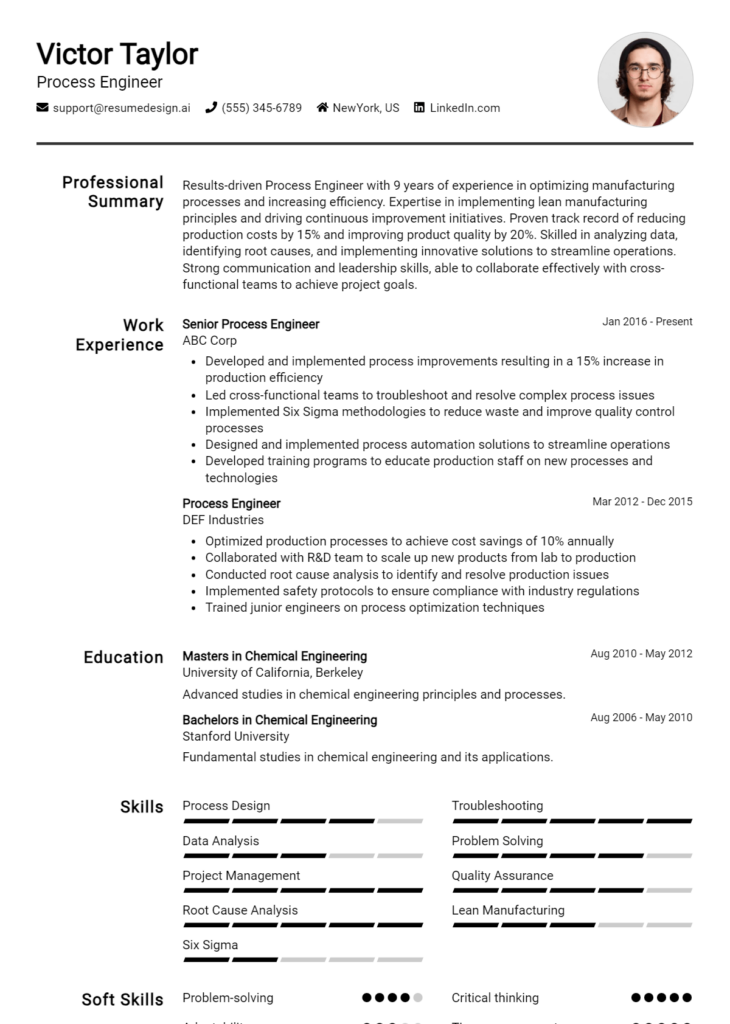Polymer Engineer Core Responsibilities
A Polymer Engineer plays a crucial role in the development, processing, and application of polymer materials, bridging the gap between design, manufacturing, and quality assurance teams. Key responsibilities include material selection, process optimization, and failure analysis, requiring strong technical skills, operational acumen, and advanced problem-solving abilities. Effective communication and collaboration across various departments enhance project outcomes, ensuring alignment with organizational goals. A well-structured resume highlighting these qualifications can significantly improve career prospects in this dynamic field.
Common Responsibilities Listed on Polymer Engineer Resume
- Develop and test new polymer materials and formulations.
- Conduct research to improve existing polymer processing techniques.
- Analyze material properties through various testing methods.
- Collaborate with design engineers to ensure product feasibility.
- Oversee production processes, ensuring compliance with quality standards.
- Implement cost-effective manufacturing solutions.
- Document findings and prepare technical reports for stakeholders.
- Provide technical support to manufacturing and production teams.
- Perform root cause analysis to address material failures.
- Stay updated on industry trends and advancements in polymer technology.
- Train and mentor junior engineers and technical staff.
High-Level Resume Tips for Polymer Engineer Professionals
A well-crafted resume is crucial for Polymer Engineer professionals as it serves as the first impression a candidate makes on potential employers. In a highly specialized field like polymer engineering, your resume must not only showcase your technical skills and achievements but also reflect your understanding of the industry and its demands. A compelling resume can set you apart from other candidates and increase your chances of landing an interview. This guide will provide practical and actionable resume tips specifically tailored for Polymer Engineer professionals, helping you to present your qualifications in the best light.
Top Resume Tips for Polymer Engineer Professionals
- Tailor your resume for each job application by incorporating keywords from the job description.
- Highlight your relevant experience, including internships and projects that demonstrate your expertise in polymer engineering.
- Quantify your achievements with specific metrics, such as cost savings, efficiency improvements, or successful project completions.
- Showcase industry-specific skills, such as polymer characterization techniques, materials testing, and process optimization.
- Include certifications or additional training relevant to polymer engineering, such as Six Sigma or project management certifications.
- Utilize a clear and professional format that enhances readability, making it easy for hiring managers to scan your qualifications.
- Incorporate a summary statement at the top of your resume that encapsulates your career highlights and aspirations in polymer engineering.
- List relevant software proficiencies, such as CAD software or simulation tools used in polymer design and analysis.
- Don't forget to include professional affiliations or memberships in relevant organizations such as the Society of Plastics Engineers.
Implementing these tips can significantly increase your chances of landing a job in the Polymer Engineer field. By tailoring your resume to highlight your relevant skills and accomplishments, you present yourself as a strong candidate who is both qualified and committed to the profession. A focused and well-organized resume will not only catch the attention of hiring managers but also convey your passion for polymer engineering, setting the stage for a successful career move.
Why Resume Headlines & Titles are Important for Polymer Engineer
In the competitive field of polymer engineering, a well-crafted resume headline or title serves as an essential first impression for potential employers. This crucial component not only captures the attention of hiring managers but also succinctly summarizes a candidate's key qualifications in a single impactful phrase. A strong headline should be concise, relevant, and directly related to the specific job being applied for, thereby allowing the candidate to stand out in a crowded job market. By effectively highlighting their expertise and achievements, candidates can pave the way for further consideration and interviews.
Best Practices for Crafting Resume Headlines for Polymer Engineer
- Keep it concise: Aim for 10-15 words that encapsulate your core skills and experience.
- Be role-specific: Tailor the headline to mirror the job title and requirements of the position.
- Highlight key skills: Incorporate specialized skills relevant to polymer engineering, such as material development or process optimization.
- Include measurable achievements: Mention specific accomplishments or certifications that set you apart.
- Use industry keywords: Incorporate terms that are commonly used in the polymer engineering field to enhance discoverability.
- Avoid clichés: Steer clear of overused phrases like "hardworking" or "team player" that add little value.
- Stay professional: Maintain a formal tone that reflects your expertise and professionalism.
- Revise regularly: Update your headline as you gain new skills or experiences to keep it relevant and fresh.
Example Resume Headlines for Polymer Engineer
Strong Resume Headlines
Innovative Polymer Engineer Specializing in Sustainable Material Development
Experienced Polymer Scientist with a Proven Track Record in Process Optimization
Results-Driven Polymer Engineer Focused on Advanced Composite Solutions
Dynamic Polymer Engineer with Expertise in Nanotechnology Applications
Weak Resume Headlines
Engineer Looking for Opportunities
Experienced Professional in Engineering
The strong headlines are effective because they immediately convey the candidate's specific strengths, skills, and areas of expertise, making them relevant to the job at hand. These titles grab the attention of hiring managers by clearly stating what the candidate offers. In contrast, the weak headlines fail to impress due to their vagueness and lack of specificity; they do not communicate any unique qualifications or demonstrate an understanding of the role, making it difficult for employers to see the value the candidate could bring to their organization.
Writing an Exceptional Polymer Engineer Resume Summary
In the competitive field of polymer engineering, a well-crafted resume summary is crucial for making a strong first impression on hiring managers. This brief section serves as a snapshot of your professional identity, quickly capturing attention by highlighting key skills, relevant experience, and notable accomplishments. An impactful summary should be concise and tailored to the specific job you are applying for, ensuring that it resonates with the employer's needs and expectations. A strong summary can set you apart from other candidates, making it essential to invest time and effort into its formulation.
Best Practices for Writing a Polymer Engineer Resume Summary
- Quantify Achievements: Use specific numbers and metrics to demonstrate your impact, such as percentage improvements or cost savings.
- Focus on Key Skills: Highlight the most relevant skills that align with the job description, such as materials science expertise, process optimization, or project management.
- Tailor for Each Job: Customize your summary for each application to reflect the specific requirements and keywords from the job posting.
- Be Concise: Limit your summary to 2-4 sentences, ensuring it remains impactful and easy to read.
- Showcase Relevant Experience: Briefly mention your years of experience and any specific industries you have worked in, particularly if they relate to the job.
- Use Action Verbs: Start sentences with strong action verbs to convey confidence and proactivity in your achievements.
- Include Certifications: If applicable, mention relevant certifications or licenses that enhance your qualifications for the role.
- Convey Passion: Reflect your enthusiasm for polymer engineering and innovation, demonstrating a genuine interest in the field.
Example Polymer Engineer Resume Summaries
Strong Resume Summaries
Dynamic Polymer Engineer with over 7 years of experience in developing high-performance materials that reduce production costs by 15%. Proven ability to lead cross-functional teams in the successful execution of projects, resulting in a 20% increase in product efficiency.
Results-driven Polymer Engineer skilled in advanced polymer processing techniques and materials characterization. Achieved a significant reduction in waste by 30% through process optimization and implemented innovative recycling solutions, enhancing sustainability efforts in manufacturing.
Detail-oriented Polymer Engineer with expertise in thermoplastic elastomers and composite materials. Successfully managed a product development cycle that launched three new products within budget and ahead of schedule, generating $2 million in revenue in the first year.
Weak Resume Summaries
Experienced engineer looking for a job in polymer development. I have worked on several projects and have a good understanding of materials.
Polymer Engineer with a background in various engineering fields. I am seeking opportunities to apply my knowledge and skills in a new role.
The strong resume summaries effectively highlight quantifiable achievements, specific technical skills, and direct relevance to the role of a Polymer Engineer, making them stand out to hiring managers. In contrast, the weak summaries are vague and lack concrete details, failing to convey the candidate's value or impact, which diminishes their appeal in a competitive job market.
Work Experience Section for Polymer Engineer Resume
The work experience section of a Polymer Engineer resume is crucial as it serves as a platform to illustrate the candidate's technical skills and their ability to manage teams effectively. This section not only highlights the candidate's hands-on experience with polymer materials and processes but also showcases their capability to deliver high-quality products that meet industry standards. By quantifying achievements and aligning their experiences with the requirements of the polymer engineering field, candidates can significantly enhance their appeal to potential employers, demonstrating their value and contributions to previous projects.
Best Practices for Polymer Engineer Work Experience
- Clearly outline specific roles and responsibilities in previous positions to demonstrate technical expertise.
- Quantify achievements with metrics, such as cost savings, efficiency improvements, or product performance enhancements.
- Highlight collaborative projects and teamwork, showcasing your ability to work effectively with cross-functional teams.
- Use industry-specific terminology to align your experience with current standards and practices.
- Include relevant certifications or specialized training related to polymer engineering.
- Focus on results-oriented statements that emphasize the impact of your contributions.
- Tailor your work experience to align with the job description of the position you are applying for.
- Showcase leadership roles or initiatives taken to drive projects forward successfully.
Example Work Experiences for Polymer Engineer
Strong Experiences
- Led a team of 5 engineers in developing a new biodegradable polymer that reduced production costs by 20% while enhancing performance metrics by 15%.
- Implemented a quality control system that decreased product defects by 30%, resulting in a 25% increase in customer satisfaction ratings.
- Collaborated with cross-functional teams to launch a new product line, achieving a sales increase of 40% within the first year.
- Designed and executed a polymer modification project that improved material strength by 35%, leading to extended product lifecycle.
Weak Experiences
- Worked on various polymer projects without specifying contributions or outcomes.
- Assisted team members with tasks related to polymer engineering.
- Participated in meetings and discussions about polymer materials.
- Contributed to projects in a supportive role without detailing the impact of my work.
The examples provided illustrate the distinction between strong and weak experiences effectively. Strong experiences are characterized by specific achievements that are quantifiable, showcasing a direct impact on projects and the ability to lead and collaborate within teams. In contrast, weak experiences lack detail and measurable outcomes, failing to convey the candidate's contributions or the significance of their role in previous positions. This highlights the importance of articulating one's experiences in a way that demonstrates value to potential employers.
Education and Certifications Section for Polymer Engineer Resume
The education and certifications section of a Polymer Engineer resume plays a crucial role in demonstrating a candidate's academic foundation and professional qualifications. This section not only highlights the candidate's formal education but also showcases industry-relevant certifications and ongoing learning initiatives. By including relevant coursework, specialized training, and certifications that reflect the latest advancements in polymer science and engineering, candidates can significantly enhance their credibility and align themselves with the expectations of potential employers. A well-crafted education and certifications section can effectively convey a commitment to professional growth and expertise in the field.
Best Practices for Polymer Engineer Education and Certifications
- Include relevant degrees in polymer science, materials engineering, or related fields.
- List certifications from recognized organizations, such as the American Society for Testing and Materials (ASTM).
- Highlight specialized training or workshops that focus on cutting-edge polymer technologies.
- Provide details on coursework that directly relates to job responsibilities, such as polymer processing or materials characterization.
- Use clear formatting to make it easy for hiring managers to identify key qualifications quickly.
- Ensure that all listed credentials are up-to-date and relevant to the current job market.
- Consider adding any continuing education courses that demonstrate a commitment to lifelong learning.
- Be concise but detailed enough to convey the importance of each qualification.
Example Education and Certifications for Polymer Engineer
Strong Examples
- M.S. in Polymer Engineering, University of Michigan, 2022
- Certified Polymer Scientist (CPS) from the Society of Plastics Engineers, 2023
- Relevant Coursework: Advanced Polymer Processing, Polymer Chemistry, Materials Characterization Techniques
- Completed a workshop on Biodegradable Polymers, 2023
Weak Examples
- B.A. in History, University of California, 2010
- Certificate in Basic Office Management, 2015
- Old certification in "Quality Control in Plastics" from a non-reputable institution, 2010
- High School Diploma, 2005 (not relevant for advanced engineering roles)
The strong examples are considered effective because they align directly with the qualifications sought in a Polymer Engineer role, showcasing relevant academic achievements and industry-recognized certifications that demonstrate expertise and commitment to the field. On the other hand, the weak examples fail to establish relevance to polymer engineering, either due to irrelevant degrees or outdated certifications that do not reflect current industry standards. This contrast emphasizes the importance of tailoring the education and certifications section to the specific requirements of the job being applied for.
Top Skills & Keywords for Polymer Engineer Resume
In the competitive field of polymer engineering, having a well-crafted resume that highlights relevant skills is crucial for standing out to potential employers. A strong skill set not only showcases your technical capabilities but also demonstrates your ability to adapt and thrive in various work environments. Employers look for candidates who possess both hard and soft skills that align with the demands of the role. By effectively communicating these skills in your resume, you can enhance your chances of landing a desirable position in the industry. For more insights on how to present your skills, check out this skills guide.
Top Hard & Soft Skills for Polymer Engineer
Soft Skills
- Problem-solving
- Effective communication
- Team collaboration
- Time management
- Attention to detail
- Critical thinking
- Adaptability
- Project management
- Creativity
- Leadership
Hard Skills
- Knowledge of polymer chemistry
- Material characterization techniques
- Polymer processing technologies
- CAD software proficiency
- Quality control and assurance
- Statistical analysis
- Research and development methodologies
- Compliance with industry standards
- Polymer testing methods
- Project lifecycle management
By integrating these essential skills into your resume alongside your work experience, you can present yourself as a well-rounded candidate equipped to meet the challenges of a polymer engineering role.
Stand Out with a Winning Polymer Engineer Cover Letter
Dear Hiring Manager,
I am writing to express my interest in the Polymer Engineer position at [Company Name], as advertised on [Job Board/Company Website]. With a Master’s degree in Polymer Science and over five years of hands-on experience in polymer processing and material development, I am excited about the opportunity to contribute to your team. My extensive background in designing innovative polymer solutions aligns well with your company’s commitment to advancing sustainable materials and enhancing product performance.
In my previous role at [Previous Company Name], I successfully led a project to develop a new biodegradable polymer that reduced production costs by 20% while maintaining high mechanical properties. This project not only showcased my technical expertise in polymer synthesis and characterization but also highlighted my ability to collaborate effectively with cross-functional teams. I have a proven track record of using advanced analytical techniques, such as spectroscopy and rheology, to optimize polymer formulations and improve product quality. Furthermore, my experience in implementing quality control measures has consistently ensured compliance with industry standards and customer specifications.
I am particularly drawn to [Company Name] due to its innovative approach to polymer applications in [specific industry or technology relevant to the company]. I am eager to bring my skills in research and development, along with my passion for sustainability, to your team. I am confident that my proactive attitude and strong problem-solving abilities will allow me to make a valuable contribution to [Company Name] and help drive the next generation of polymer products.
Thank you for considering my application. I am looking forward to the opportunity to discuss how my background, skills, and enthusiasms align with the goals of [Company Name]. I am excited about the potential to be part of such a forward-thinking company and contribute to groundbreaking advancements in polymer technology.
Sincerely,
[Your Name]
[Your Phone Number]
[Your Email Address]
Common Mistakes to Avoid in a Polymer Engineer Resume
When crafting a resume as a Polymer Engineer, it’s essential to highlight your technical skills and relevant experiences effectively. However, many candidates make common mistakes that can detract from their qualifications and reduce their chances of landing an interview. Avoiding these pitfalls can significantly enhance the impact of your resume and showcase your expertise in the field.
Neglecting Technical Skills: Failing to list specific polymer processing techniques or materials knowledge can leave hiring managers questioning your qualifications. Always include relevant technologies and methodologies you are proficient in.
Using Generic Job Descriptions: Copying and pasting job descriptions from previous positions without tailoring them to your specific responsibilities can misrepresent your role. Use action verbs and be specific about your contributions and achievements.
Ignoring Keywords: Not incorporating industry-specific keywords can lead your resume to be overlooked by applicant tracking systems (ATS). Research the job description and include relevant terms that align with the position.
Lack of Quantifiable Achievements: Failing to provide metrics or tangible outcomes of your work can make your contributions seem less significant. Use numbers to illustrate improvements, such as percentage increases in efficiency or reductions in costs.
Overloading with Jargon: Using too much technical jargon can alienate hiring managers who may not be familiar with specific terms. Strive for a balance between demonstrating expertise and ensuring readability.
Poor Formatting: A cluttered or unprofessional layout can distract from your qualifications. Use clear headings, bullet points, and consistent font styles to create a clean and organized appearance.
Omitting Relevant Certifications: Failing to mention relevant certifications, such as Six Sigma or specific polymer science credentials, can undermine your expertise. Always include any certifications that bolster your qualifications.
Neglecting to Proofread: Spelling and grammatical errors can create a negative impression and suggest a lack of attention to detail. Carefully proofread your resume to ensure it is error-free and polished.
Conclusion
As we have explored throughout this article, the role of a Polymer Engineer is both dynamic and critical to various industries, from automotive to healthcare. Key responsibilities include the design and development of polymer materials, conducting research to improve material performance, and collaborating with multidisciplinary teams to innovate solutions. Staying updated with the latest advancements in polymer technology is essential for success in this field.
Moreover, the importance of a well-crafted resume cannot be overstated for aspiring Polymer Engineers. A strong resume not only highlights your technical skills and experiences but also demonstrates your ability to contribute to cutting-edge projects and research.
Now is the time to take action! Review your Polymer Engineer resume to ensure it effectively showcases your qualifications and aligns with industry standards. Utilize available resources such as resume templates, which can help structure your information professionally. Consider using a resume builder to create a polished document efficiently. You can also find resume examples specific to Polymer Engineering to get inspiration and ideas. And don’t forget about the importance of a compelling cover letter; explore our cover letter templates to make a strong first impression.
Take the next step in your career by refining your application materials today!

